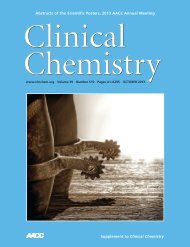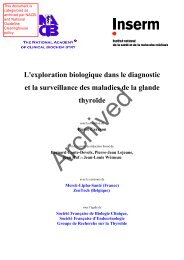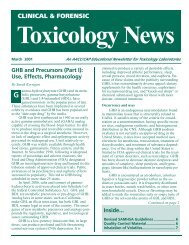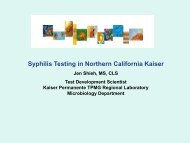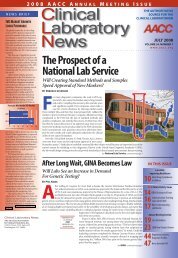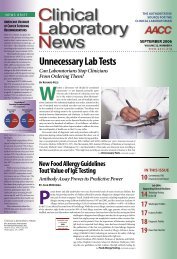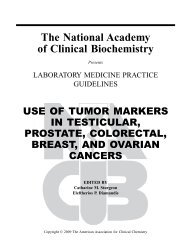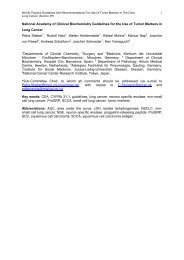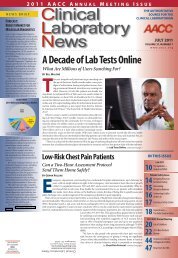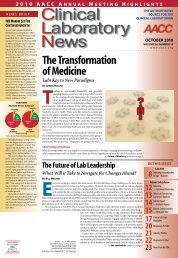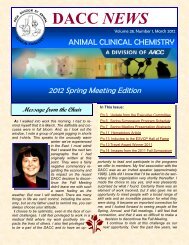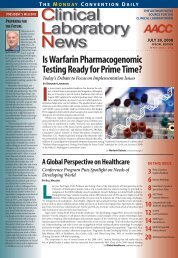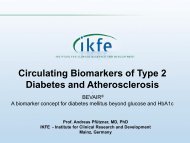June 2012 - American Association for Clinical Chemistry
June 2012 - American Association for Clinical Chemistry
June 2012 - American Association for Clinical Chemistry
Create successful ePaper yourself
Turn your PDF publications into a flip-book with our unique Google optimized e-Paper software.
Screening Tests Spark Controversy<br />
Screening Tests, continued from page 1 The Choosing Wisely Campaign<br />
dilemma we face,” he said. “But I think<br />
people trained in clinical lab science have<br />
a lot to offer here, and I hope they can help<br />
us educate clinicians.” Harris was a member<br />
of the United States Preventive Services<br />
Task Force (USPSTF) from 2003–2008.<br />
Overuse Looms, But Evades<br />
Easy Measurement<br />
Whether they be regulators, lawmakers, or<br />
pundits on the evening news, all seem to<br />
agree that the cost of healthcare is becoming<br />
unsustainable. Most recently, Medicare<br />
has projected that by 2020, national health<br />
spending could reach $4.6 trillion and<br />
comprise nearly 20% of gross domestic<br />
product. Making matters worse, it appears<br />
that the nation is addicted to profligate<br />
testing and treatments that by some estimates<br />
consume up to 30% of healthcare<br />
spending.<br />
Despite this highly charged atmosphere,<br />
professional and consumer groups have<br />
chosen to team up and weigh in on how<br />
the nation should grapple with its healthcare<br />
spending problem. In a first-of-itskind<br />
response to overuse, a new campaign<br />
called Choosing Wisely from the <strong>American</strong><br />
Board of Internal Medicine Foundation<br />
has brought together nine top medical<br />
societies as well as Consumer Reports to<br />
educate both physicians and patients about<br />
common unnecessary tests and treatments.<br />
Each physician specialty society published<br />
a list of “Five Things Physicians and Patients<br />
Should Question.” Many of the 45<br />
items implicate unnecessary imaging or<br />
laboratory screening tests (See Box, right).<br />
Two separate but related initiatives from<br />
the <strong>American</strong> College of Physicians (ACP)<br />
parallel Choosing Wisely. ACP, a Choosing<br />
Wisely participant, has announced its own<br />
partnership with Consumer Reports. The<br />
two organizations are developing patientoriented<br />
brochures and other resources<br />
to help patients understand the benefits,<br />
harms, and costs of tests and treatments<br />
<strong>for</strong> common clinical issues. The resources<br />
will be derived from ACP’s evidence-based<br />
clinical practice recommendations published<br />
in Annals of Internal Medicine and<br />
on the Consumer Reports website. This<br />
patient-centered initiative comes 2 years<br />
after ACP’s other project, the High Value,<br />
Cost-Conscious Care Initiative, which was<br />
aimed at physicians.<br />
The most recent product from the<br />
High Value, Cost-Conscious care series,<br />
published in January <strong>2012</strong>, focused on<br />
screening and diagnostic tests. ACP convened<br />
a workgroup of physicians under a<br />
consensus-based process to identify tests<br />
that did not reflect high-value care (Ann<br />
Intern Med <strong>2012</strong>;156:147–149). Similar to<br />
Choosing Wisely, ACP’s list of 37 clinical<br />
scenarios includes many imaging tests, but<br />
about half encompass clinical lab tests (See<br />
Online Extra).<br />
Despite testing being a target, many<br />
of the group’s recommendations may<br />
not provoke much controversy in the lab<br />
community. But if laboratorians do disagree<br />
with such recommendations, new<br />
research reveals that the medical literature<br />
on overuse of lab tests is extremely limited.<br />
A study published as part of the Archives of<br />
Internal Medicine’s Less Is More series re-<br />
viewed 114,831 publications over 21 years<br />
and found only 172 articles that addressed<br />
overuse of healthcare (Arch Intern Med<br />
<strong>2012</strong>;172:171–178). The majority of the<br />
studies focused on four interventions: antibiotics<br />
<strong>for</strong> upper respiratory tract infections,<br />
and three cardiovascular procedures.<br />
Just a handful addressed lab tests, notably<br />
PSA and fecal occult blood testing (FOBT).<br />
According to study coauthor Salomeh<br />
Keyhani, MD, MPH, the reason <strong>for</strong> the<br />
paucity of studies on overuse of lab tests is<br />
clear: too few definitive guidelines. “If you<br />
want to eliminate inappropriate care, you<br />
have to designate what exactly is inappropriate,<br />
which is not an easy thing,” she said.<br />
“Diagnostic tests are a particular challenge<br />
in terms of establishing when it’s appropriate<br />
to order them. The indications <strong>for</strong> diagnostic<br />
testing are not routinely evaluated in<br />
the same way as indications <strong>for</strong> therapeutic<br />
procedures.” Keyhani is an assistant professor<br />
of medicine and of health evidence and<br />
policy at the Mount Sinai School of Medicine<br />
in New York.<br />
Moreover, where guidelines do exist,<br />
whether <strong>for</strong> tests or treatments, they often<br />
conflict, Keyhani noted. “In the U.S., we<br />
have a free market <strong>for</strong> guidance,” she said.<br />
“We have every single medical specialty society<br />
with its own emphasis and own focus<br />
putting out guidelines, and to some extent,<br />
they disagree.”<br />
Data and Decision-Making<br />
With screening tests showing up on lists<br />
of questionable practices and under the<br />
spotlight <strong>for</strong> research on overuse, there<br />
should be no surprise that screening tests<br />
also stimulate the most public controversy.<br />
To be sure, the public has strong opinions.<br />
A seminal study in 2004 found that<br />
74% of <strong>American</strong> adults believed that<br />
finding cancer early via screening saved<br />
lives most or all of the time, and many<br />
said that an 80-year-old who chose not<br />
to be screened was irresponsible (JAMA<br />
2004;291:71–78). In addition, two-thirds<br />
of respondents indicated they would<br />
want to be screened <strong>for</strong> a cancer even if<br />
no treatment was available.<br />
More recently, in 2011 a draft “D” recommendation—the<br />
strongest negative<br />
statement—from USPSTF against PSA<br />
screening at any age led to public outcry<br />
and widespread media coverage (CLN<br />
2011;37:11). USPSTF also took a more<br />
cautious view of Pap testing in March of<br />
this year, recommending women ages 21<br />
to 65 be screened only every 3 years. Then<br />
in April, USPSTF published draft recommendations<br />
on screening <strong>for</strong> chronic kidney<br />
disease that contains an “I” statement<br />
<strong>for</strong> insufficient evidence. In recent years,<br />
USPSTF advisories have taken on more<br />
weight as most payers, including Medicare,<br />
rely heavily on their recommendations to<br />
make decisions about coverage and reimbursement.<br />
Evidence suggests that cancer screening<br />
tests in particular have unusual patterns of<br />
utilization: potentially significant overuse<br />
in some cases, and underuse in others. A<br />
Government Accountability Office (GAO)<br />
report released in January found that use<br />
of some screenings—<strong>for</strong> cardiovascular<br />
disease and cervical cancer—by Medicare<br />
beneficiaries generally aligned with clini-<br />
Group Urges Patients, Physicians to Question Tests<br />
Nine leading physician specialty societies have identified specific<br />
tests or procedures that they say are commonly used but not always<br />
necessary in their respective fields and put <strong>for</strong>ward “Five Things<br />
Physicians and Patients Should Question.” Created by the <strong>American</strong><br />
Board of Internal Medicine (ABIM), the ABIM Foundation spearheaded<br />
the campaign.<br />
Consumer Reports—the world’s largest independent product<br />
testing organization—is working with the ABIM Foundation and<br />
the specialty societies to lead the ef<strong>for</strong>t. Consumer Reports will also<br />
work with other consumer-oriented organizations such as AARP.<br />
The nine participating specialty societies include the <strong>American</strong><br />
Academy of Allergy, Asthma and Immunology, <strong>American</strong> Academy of<br />
Family Physicians, <strong>American</strong> College of Cardiology, <strong>American</strong> College<br />
of Physicians, <strong>American</strong> College of Radiology, <strong>American</strong> Gastroenterological<br />
<strong>Association</strong>, <strong>American</strong> Society of <strong>Clinical</strong> Oncology,<br />
<strong>American</strong> Society of Nephrology, and <strong>American</strong> Society of Nuclear<br />
Cardiology.<br />
“By identifying tests and procedures that might warrant additional<br />
conversations between doctors and patients, we are able to<br />
help patients receive better care through easy-to-use and accessible<br />
in<strong>for</strong>mation,” said James A. Guest, JD, president and CEO of Consumer<br />
Reports. “We’re looking <strong>for</strong>ward to being a part of this innovative<br />
ef<strong>for</strong>t working with the ABIM Foundation, the specialty societies,<br />
and our eleven consumer communications collaborators to get this<br />
important message out to diverse populations of patients.”<br />
In addition, the campaign announced eight new participating<br />
specialty societies that will release lists in fall <strong>2012</strong>: <strong>American</strong><br />
Academy of Hospice and Palliative Medicine, <strong>American</strong> Academy of<br />
Otolaryngology–Head and Neck Surgery, <strong>American</strong> College of Rheumatology,<br />
<strong>American</strong> Geriatrics Society, <strong>American</strong> Society <strong>for</strong> <strong>Clinical</strong><br />
Pathology, <strong>American</strong> Society of Echocardiography, Society of Hospital<br />
Medicine, and Society of Nuclear Medicine.<br />
Examples from “Things Physicians and Patients Should<br />
Question”:<br />
® Don’t per<strong>for</strong>m unproven diagnostic tests, such as immunoglobulin<br />
G (IgG) testing or an indiscriminate battery of immunoglobulin<br />
E (IgE) tests, in the evaluation of allergy.<br />
® Don’t routinely do diagnostic testing in patients with chronic<br />
urticaria.<br />
® Don’t per<strong>for</strong>m Pap smears on women younger than age 21 or<br />
who have had a hysterectomy <strong>for</strong> non-cancer disease.<br />
® In patients with low pretest probability of venous thromboembolism<br />
(VTE), obtain a high-sensitivity D-dimer measurement as the<br />
initial diagnostic test; don’t obtain imaging studies as the initial<br />
diagnostic test.<br />
® Do not repeat colorectal cancer screening by any method <strong>for</strong> 10<br />
years after a high-quality colonoscopy is negative in average-risk<br />
individuals.<br />
® Don’t per<strong>for</strong>m surveillance testing (biomarkers) or imaging (PET,<br />
CT, and radionuclide bone scans) <strong>for</strong> asymptomatic individuals<br />
who have been treated <strong>for</strong> breast cancer with curative intent.<br />
® Don’t per<strong>for</strong>m routine cancer screening (mammography, colonoscopy,<br />
PSA, Pap smears) <strong>for</strong> dialysis patients with limited life expectancies<br />
and without signs or symptoms of conditions detected by<br />
these tests.<br />
cal recommendations, but other cancer<br />
screening tests did not. For example, even<br />
though USPSTF recommends biannual<br />
breast cancer screening in women ages 65<br />
to 74, only two out of three beneficiaries<br />
in this age group received a mammogram<br />
in 2008 or 2009. In the case of colorectal<br />
cancer screening, only one in four beneficiaries<br />
ages 65 to 75 received any of the<br />
recommended regimens. With PSA testing<br />
<strong>for</strong> prostate cancer, overuse was the<br />
problem: almost half of men age 75 or<br />
older were tested, contrary to USPSTF<br />
recommendations.<br />
In a more striking example, researchers<br />
at the University of Chicago Medical Center<br />
evaluated changes in national screening<br />
rates be<strong>for</strong>e and after the USPSTF 2008<br />
recommendation against PSA screening in<br />
men older than 75. They found that PSA<br />
screening rates were unchanged from 2005<br />
to 2010 in all age groups (JAMA <strong>2012</strong>;<br />
307:1692–1694). Apparently, physicians<br />
See Screening Tests, continued on page 4<br />
CliniCal laboratory news <strong>June</strong> <strong>2012</strong> 3



